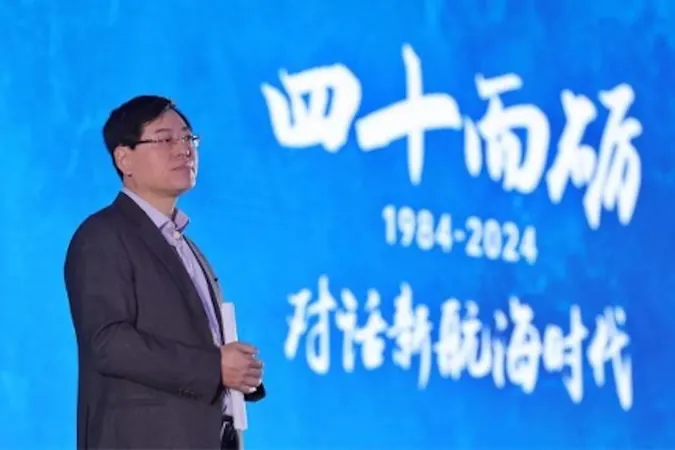
Lenovo at 40: The Global Journey of a Tech Giant and Its Role in Shaping the Future
2024-11-04
Author: Wei
On November 1, 1984, Lenovo was born in a modest reception room in Zhongguancun, Beijing, marking a pivotal moment in China’s economic landscape. This year is often recognized as the "Year One" for China's private enterprises, witnessing the emergence of innovative companies such as Lenovo, Haier, and Vanke. Now, as Lenovo steps into its fifth decade, it is set to embrace AI transformation as part of its evolving mission.
The year 2024 will also commemorate the 20th anniversary of Lenovo’s bold globalization strategy. As a pioneering Chinese high-tech enterprise, Lenovo weathered numerous economic shifts and technological advancements over the past two decades and now operates in 180 countries and regions. With a workforce of approximately 70,000, 18 global R&D centers, and over 30 manufacturing bases, Lenovo has rightfully earned its position as one of the foremost tech powerhouses in the world.
Lenovo Group Chairman and CEO Yang Yuanqing reflects on the company’s transformative journey: “Globalization was one of the most strategic and correct decisions Lenovo ever made. Without reform and opening up, without globalization, there would be no Lenovo as it stands today.”
A 20-Year Evolution: From “Snake Swallowing Elephant” to a Global Force
Yang recalls Lenovo’s transformative milestone in December 2004—the $3 billion acquisition of IBM's $10 billion PC business, a bold move often likened to “a snake swallowing an elephant.” This acquisition initiated Lenovo’s true globalization journey. In recounting this crucial moment, Yang mentioned a formative trip to the U.S. in 2000, where he visited tech titans to gather insights on how Lenovo could become a global player.
However, achieving globalization is not solely about acquisitions; it demands comprehensive integration. This integration includes aligning products, brands, supply chains, and corporate cultures, making it a complex endeavor. Throughout the post-acquisition phase, Lenovo wisely chose to manage Lenovo and IBM brands separately to minimize disruption, only deepening the integration once stability was achieved.
Cultural integration presented significant challenges. Lenovo's management style focused on vertical structures while IBM adhered to a matrix approach. Language barriers also emerged, with Lenovo accustomed to Chinese terminology and IBM communicating in English. Overcoming these hurdles fortified Lenovo's resilience, allowing it to develop valuable strategies for global business.
In summarizing Lenovo’s globalization journey, Yang identified three core pillars: a global supply chain, a robust global R&D system, and a dynamic global marketing system. Additionally, he emphasized the importance of digitalization and ESG (Environmental, Social, and Governance) initiatives as essential foundations for Chinese companies aiming to thrive on the global stage.
China as the Heart of Global Growth
Yang asserts that the roots of Chinese enterprises' success in global markets remain strongly anchored in China. Currently, 80% of Lenovo's manufacturing and 70% of its R&D talent are based in the country. This synergistic approach allows Lenovo to engage deeply with international markets while simultaneously bolstering the domestic economy, exemplifying China's commitment to expanding its global influence.
As the global landscape for Chinese businesses rapidly evolves, Yang highlights the need for companies to not only venture abroad but also progress in elevating their value. He offered several strategic recommendations: build recognized brands through local innovation, foster resilient supply chains by staying in touch with local markets, and nurture strong corporate citizenship through collaborative partnerships.
A Groundbreaking Publication on Globalization
In recognition of Lenovo’s successful globalization strategies, Citic Publishing Group has released a significant work titled *Going Global: 20 Years of Lenovo’s Practical Globalization Methodologies*, illustrating Lenovo’s impressive 18-fold increase in annual revenue over two decades and its role as a “globalization trailblazer.” This new publication underscores the notion of “Glocalization,” highlighting the importance of global and local integration—a theme that resonates with the new generation of businesses seeking to navigate an increasingly interconnected world.
As China celebrates the 40-year milestone since it opened its economy, Lenovo's journey from a domestic company to a global leader not only exemplifies the success of private enterprises in China but also paves the way for others aiming to follow in its footsteps. The world is watching as Lenovo continues on its path of "going out," "moving in," and "moving up," demonstrating the power of innovation and integration in a rapidly changing economic landscape.


 Brasil (PT)
Brasil (PT)
 Canada (EN)
Canada (EN)
 Chile (ES)
Chile (ES)
 España (ES)
España (ES)
 France (FR)
France (FR)
 Hong Kong (EN)
Hong Kong (EN)
 Italia (IT)
Italia (IT)
 日本 (JA)
日本 (JA)
 Magyarország (HU)
Magyarország (HU)
 Norge (NO)
Norge (NO)
 Polska (PL)
Polska (PL)
 Schweiz (DE)
Schweiz (DE)
 Singapore (EN)
Singapore (EN)
 Sverige (SV)
Sverige (SV)
 Suomi (FI)
Suomi (FI)
 Türkiye (TR)
Türkiye (TR)